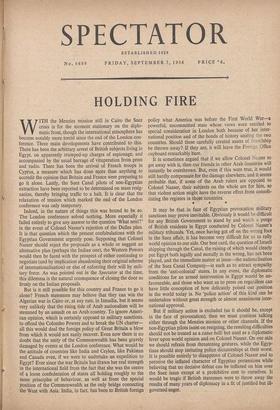HOLDING FIRE
WITH the Menzies mission still in Cairo the Suez crisis is for the moment stationary on the diplo- matic front, though the international atmosphere has become notably more torrid since the end of the London con- ference. Three main developments have contributed to this. There has been the arbitrary arrest of British subjects living in Egypt, on apparently trumped-up charges of espionage, and accompanied by the usual barrage of vituperation from press and radio. There has been the arrival of French troops in Cyprus, a measure which has done more than anything to accredit the opinion• that Britain and France were preparing to go it alone. Lastly, the Suez Canal pilots of non-Egyptian extraction have been reported to be determined on mass resig- nation, thereby bringing traffic to a halt. It is clear that the relaxation of tension which marked the end of the London conference was only temporary.
Indeed, in the nature of things this was bound to be so. The London conference solved nothing. More especially it failed entirely to give any answer to the question 'What next?' in the event of Colonel Nasser's rejection of the Dulles plan. It is that question which the present confabulations with the Egyptian Government urgently pose. Supposing that Colonel Nasser should reject the proposals as a whole or suggest an alternative plan (perhaps the Indian one), the Western Powers would then be faced with the prospect of either continuing to negotiate (and by implication abandoning their original scheme of internationalisation) or else of enforcing their will by mili- tary force. As was pointed out in the Spectator at the time, this dilemma is the natural consequence of closing the door so firmly on the Indian proposals.
But is it still possible for this country and France to go it alone? French statesmen may believe that they can win the Algerian war in Cairo or, at any rate, in Ismailia, but it seems very unlikely that the rising tide of Arab nationalism will be stemmed by an assault on an Arab country. To ignore Ameri- can opinion, which is certainly opposed to military sanctions, to offend the Colombo Powers and to break the UN charter— all this would deal the foreign policy of Great Britain a blow from which it would not easily recover. Even now there is no doubt that the unity of the Commonwealth has been gravely damaged by events at the London conference. What would be the attitude of countries like India and Ceylon, like Pakistan and Canada even, if we were to undertake an expedition to Egypt? Ever since the war Britain has drawn her real strength in the international field from the fact that she was the centre of a loose confederation of states all holding roughly to the same principles of behaviour, as well as from the special position of the Commonwealth as the only bridge connecting the West with Asia. India, in fact, has been to British foreign policy what America was before the First World War—a powerful, uncommitted state whose views were entitled to special consideration in London both because of her inter- national position and of the bonds of history uniting the two countries. Should these carefully created assets of friendship be thrown away? If they are, it will leave the Foreign Office cupboard remarkably bare.
It is sometimes argued that if we allow Colonel Nasser to get away with it, then our friends in other Arab countries will instantly be overthrown. But, even if this were true, it would still hardly compensate for the damage elsewhere, and it seems probable that, if some of the Arab rulers are opposed to Colonel Nasser, their subjects on the whole are for him, so that violent action might have the reverse effect from consoli- dating the regimes in those countries.
It may be that in face of Egyptian provocation military sanctions may prove inevitable. Obviously it would be difficult for any British Government to stand by and watch a purge of British residents in Egypt conducted by Colonel Nasser's military tribunals. Yet, once having got off on the wrong foot in the Suez affair, it has become very difficult for us to rally world opinion to our side. Our best card, the question of Israeli shipping through the Canal, the raising of which would clearly put Egypt both legally and morally in the wrong, has not been played, and the immediate matter at issue—the nationalisation of the Suez Canal Company—is such as to attract sympathy from the 'anti-colonial' states. In any event, the diplomatic conditions for an armed intervention in Egypt would be un- favourable, and those who want us to press on regardless can have little conception of how delicately poised our position in the world today is. No 'police action' of this kind can be undertaken without great strength or almost unanimous inter- national approval.
But if military action is excluded (as it should be, except in the face of provocation), then we must continue talking either through the Menzies mission or other channels. If the non-Egyptian pilots insist on resigning, the resulting difficulties should not be treated as a casus belli but used as a diplomatic lever upon world opinion and on Colonel Nasser. On our side we should refrain from threatening gestures, while the Egyp- tians should stop imitating police dictatorships at their worst. It is possible entirely 'to disapprove of Colonel Nasser and to perceive the inflated character of Egyptian pretensions while believing that no decisive defeat can be inflicted on him over the Suez issue except at a prohibitive cost to ourselves. It would be tragic if British statesmen were to throw away the results of many years of diplomacy in a fit of justified but ill- governed anger.


































 Previous page
Previous page